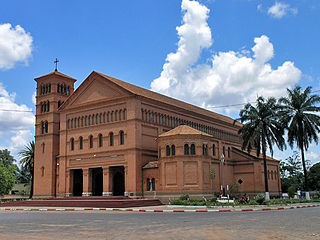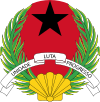
Guinea-Bissau, officially the Republic of Guinea-Bissau, is a country in West Africa that covers 36,125 square kilometres (13,948 sq mi) with an estimated population of 2,026,778. It borders Senegal to its north and Guinea to its southeast.
Freedom of religion in Colombia is enforced by the State and well tolerated in the Colombian culture. The Republic of Colombia has an area of 439,735 square miles and its population is estimated at 46 million.

Sunni Islam is the dominant religion in Jordan. Muslims make up about 97.2% of the country's population. A few of them are Shiites. Many Shia in Jordan are refugees from Syria, Lebanon, and Iraq.

Christianity is a minority religion in Yemen. The Yemeni constitution mentions religious liberty. There are three churches in Aden.

Christianity is a minority religion in Tajikistan.

Christianity is the largest religion in Uruguay, with Catholics having the most adherents, but around 44.5% of the population is non-religious as of 2021. Church and state are officially separated since 1916.

Christianity is the largest religion in Benin, with substantial populations of Muslims and adherents of traditional faiths. According to the most recent 2020 estimate, the population of Benin is 52.2% Christian, 24.6% Muslim, 17.9% traditionalist and 5.3% follows other faiths or has no religion.

Christianity is the most widely professed religion in Zimbabwe, with Protestantism being its largest denomination.

Christianity is the largest religion in Tanzania, with a substantial Muslim minority. Smaller populations of Animists, practitioners of other faiths, and religiously unaffiliated people are also present.

Christianity is the predominant religion in Eswatini, with Protestantism being its largest denomination. The royal family of Eswatini is officially Christian.

Christianity is the dominant religion in Lesotho, with Protestantism and Catholicism being its main denominations.

Religion in Eritrea consists of a number of faiths. The two major religions in Eritrea are Christianity and Islam. However, the number of adherents of each faith is subject to debate. Estimates of the Christian share of the population range from 47% and 63%, while estimates of the Muslim share of the population range from 37% to 52%.
According to the 2012 census, Islam is the most followed religion in Niger and is practiced by 99% of the population. According to Pew, roughly 80% of Muslims are Sunni of Maliki school of jurisprudence, whilst 20% are non-denominational Muslims Other religions practiced in Niger include Animism and Christianity.

Christianity is the majority religion in Cameroon, with significant minorities of the adherents of Islam and traditional faiths.

Christianity is the largest religion in Nauru, with Nauru Congregational Church being the largest denomination, encompassing 35.71% of the population as of the 2011 census.

Christianity is the most widely professed religion in Tanzania, but in the island of Zanzibar most of the population is Muslim.

Christianity is the largest religion in Guinea-Bissau, constituting approximately 57% of the country's population according to a comprehensive 2019 survey by the World Bank. Various missionary groups operate freely throughout the nation.

Christianity is the majority religion of the Democratic Republic of the Congo and is professed by a majority of the population.
The main religion in Morocco is Sunni Islam, which is also the state religion of the country. Officially, 99% of the population are Muslim, and virtually all of those are Sunni. The second-largest religion in the country is Christianity, but most Christians in Morocco are foreigners. There is a community of the Baháʼí Faith. Only a fraction of the former number of Maghrebi Jews have remained in the country, many having moved to Israel.
The status of religious freedom in Africa varies from country to country. States can differ based on whether or not they guarantee equal treatment under law for followers of different religions, whether they establish a state religion, the extent to which religious organizations operating within the country are policed, and the extent to which religious law is used as a basis for the country's legal code.

















